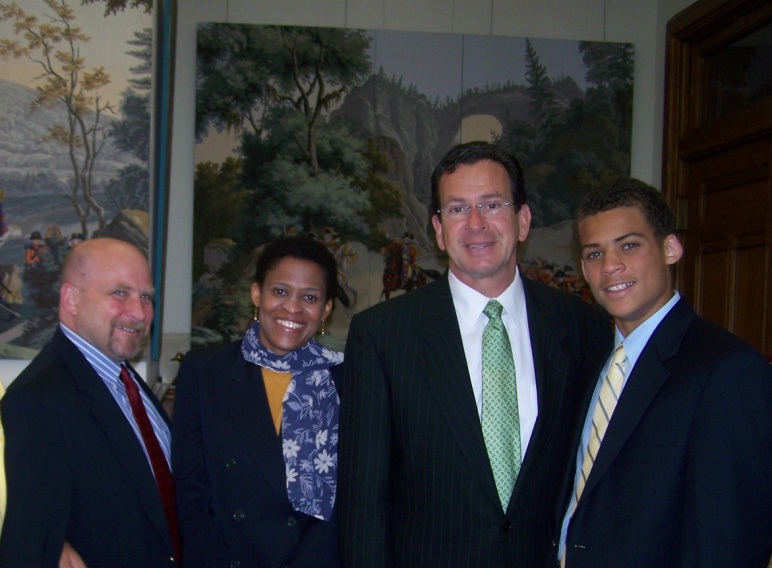This article was originally published on NCLD.org.
My name is Kathy Thompson and my son Jeffrey is a great kid and an excellent athlete. You would think that he doesn’t have a care in the world, except to make the first string on his football or wrestling team, but that is far from the case. Since kindergarten, Jeffrey struggled to read.
As his school assignments got tougher, the pain grew more visible and homework nights

were met with frustration. Words stuck in his brain. We often talked about why his friends could read well and he could not.
By sixth grade, Jeffrey could not keep up with his studies. I felt helpless and cried alot. He did too! When he was behind grade level by four years, I quit my job determined to find the strategies and resources that would minimize his LD. I felt obligated to help other families deal with similar issues. My journey is one that I hope parents will not have to endure. At one of my son’s schools, his teachers could not find a solution to his reading challenges. They tested, they tried interventions; nothing pointed to dyslexia. They were perplexed as to how this intelligent, soft-spoken boy could comprehend verbal instructions, but failed in reading. I searched for answers and found that persons with dyslexia often go undiagnosed and many K-12 teachers aren’t trained to address this reading disability.
There are still some educators who label kids, especially boys, as lazy and overlook a learning disability if a student is an athlete, like my son. This stereotype follows young athletic males who like to play sports. Dropout rates and behavior problems for them increase.
Last year, we visited our Governor of Connecticut, Mr. Dannel Malloy, who is dyslexic. He and Jeffrey talked about labels and how difficult school work can be when you are dyslexic and hiding your learning challenges from friends, parents, and teachers.
Governor Malloy credits his lifelong journey with dyslexia as a way to develop intense listening skills. My son is a very good listener.
He encouraged Jeffrey to embrace his reading challenges and to identify strategies and technologies that would compensate for his disability. “Maximize your strengths and move forward,” he told my son. “Don’t let it get you down!”
Jeffrey told the Governor about Bookshare, an online digital library, offering vast collections of digital educational books and textbooks funded by federal tax dollars through the U.S. Department of Education, Office of Special Education Programs (OSEP). Bookshare membership is free for U.S. schools and students who qualify including those who are blind, have low vision, a physical disability, or reading disability, like dyslexia.
With a free membership and the free reading technology offered by Bookshare, Jeffrey was reading and comprehending more information almost overnight. He began to make sense of the content he read aloud in a digital book through text-to-speech. It didn’t take him long to learn how to download books to his portable devices either. This assistive technology (AT) accommodation (to hear and see text read aloud) was just what Jeffrey needed—a different way to retain knowledge by listening to the content.
Imagine how many more students who could achieve higher academic success with the right combination of tools and resources and an earlier diagnosis? Through my research, I learned that the percentage of people with dyslexia may be much higher than we think. I learned that I could request an independent evaluation for Jeffrey under the IDEA law (Individuals with Disabilities Education Act) at his school. I attended workshops at the New England Assistive Technology Center (NEAT) where I could explore Bookshare and different assistive technology tools. I learned that people with dyslexia comprehend more information with multi-modal learning support.
If more parents and educators knew about Bookshare and assistive technology tools, could we spare a child the heartache of long, frustrating home work nights?
If we were more informed about the benefits of technologies and resources, like digital books from Bookshare, would we be better prepared to discuss these learning supports in parent-teacher conferences?
Could we identify curriculum requirements early so that appropriate accessible textbooks and accommodations were provided earlier in the learning process and so progress monitoring could occur?
Using digital books and technologies, would teachers discover new opportunities for individualized instruction or to deliver a strategy called Universal Design for Learning (UDL) where multiple representations of instruction are provided? How do we let our kids know that it’s okay to use the technology or strategies they need to succeed academically?
We can change the course! Yes, it’s difficult for parents to accept that their child has a learning disability, but equally hard to stand by and let them be hindered by labels, lack of technology, lack of awareness of educational resources, like digital books and assistive technologies.
This year, I went back to work. Jeffrey enrolled in a new school district that has a dedicated Assistive Technology staff member who helps him use Bookshare. He received an academic achievement award and won the state wrestling championship. His confidence is high and he has enrolled in classes to prepare for high school and college. Jeffrey no longer feels “different” and can keep up with his reading assignments. His hope is that his successes will encourage other students with dyslexia to keep moving forward, as our Governor suggested to him not so long ago.
We invite other parents with stories to share to please comment below.

Congratulations Jeffrey and Kathy! You are true inspirations.
I admire this mom….:)
hats off to your determination.nothing is impossible we just need to explore new things and work on that for our benefits and others.we just need to focus on the abilities.you did it.